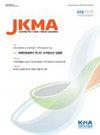可切除非小细胞肺癌的辅助治疗
IF 0.5
Q3 MEDICINE, GENERAL & INTERNAL
引用次数: 0
摘要
背景:低剂量胸部计算机断层扫描越来越多地用于筛查肺癌,早期诊断的肺癌患者在潜在可切除阶段的比例正在增加。在完全切除后,减少术后复发的可能性是重中之重。本文简要介绍了可切除非小细胞肺癌(NSCLC)辅助治疗的最新进展。当前概念:尽管传统上使用以铂为基础的辅助化疗,但总生存期仅小幅增加,复发率降低15%。讨论与结论:随着免疫疗法和表皮生长因子受体酪氨酸激酶抑制剂的出现,完全可切除的非小细胞肺癌的辅助治疗前景正在迅速改变。ADAURA研究显示,无论先前是否接受术后铂基化疗,辅助奥希替尼都能显著延长可切除的表皮生长因子受体突变阳性NSCLC患者的无病进展生存期。IMpower010研究表明,对于没有靶向突变的患者,术后atezolizumab可以作为减少术后复发可能性的一种选择。术后放疗对淋巴结转移患者是有益的(N2)。本文章由计算机程序翻译,如有差异,请以英文原文为准。
Adjuvant treatment for resectable non-small cell lung cancer
Background: Low-dose chest computed tomography is being increasingly used to screen for lung cancer, and the proportion of early diagnoses of patients with lung cancer in potentially resectable stages is increasing. After complete resection, reducing the possibility of postoperative relapse is of the utmost priority. In this review, recent updates in adjuvant treatment for resectable non-small cell lung cancer (NSCLC) were briefly explained.Current Concepts: Even though platinum-based adjuvant chemotherapy was traditionally used, there was only a small increase in overall survival and a 15% decrease in relapse.Discussion and Conclusion: With the advent of immunotherapy and epidermal growth factor receptor tyrosine kinase inhibitors, the landscape of adjuvant treatment for completely resectable NSCLC is rapidly changing. The ADAURA study showed that adjuvant osimertinib, regardless of prior platinum-based postoperative chemotherapy, significantly extended disease-free progression survival in epidermal growth factor receptor mutation-positive patients with resectable NSCLC. The IMpower010 study showed that postoperative atezolizumab can be an option in patients without targetable mutations for reducing the possibility of postoperative relapse. Postoperative radiotherapy can be beneficial for patients with lymph node metastases (N2).
求助全文
通过发布文献求助,成功后即可免费获取论文全文。
去求助
来源期刊

Journal of The Korean Medical Association
Medicine-General Medicine
CiteScore
0.50
自引率
0.00%
发文量
84
审稿时长
4-8 weeks
期刊介绍:
The Journal of the Korean Medical Association (JKMA) is the official peer-reviewed, open-access, monthly journal of the Korean Medical Association (KMA). It contains articles in Korean or English. Its abbreviated title is ''J Korean Med Assoc''. The aims of the Journal include contributing to the treatment of and preventing diseases of public health importance and to improvement of health and quality of life through sharing the state-of the-art scientific information on medicine by the members of KMA and other national and international societies.
 求助内容:
求助内容: 应助结果提醒方式:
应助结果提醒方式:


